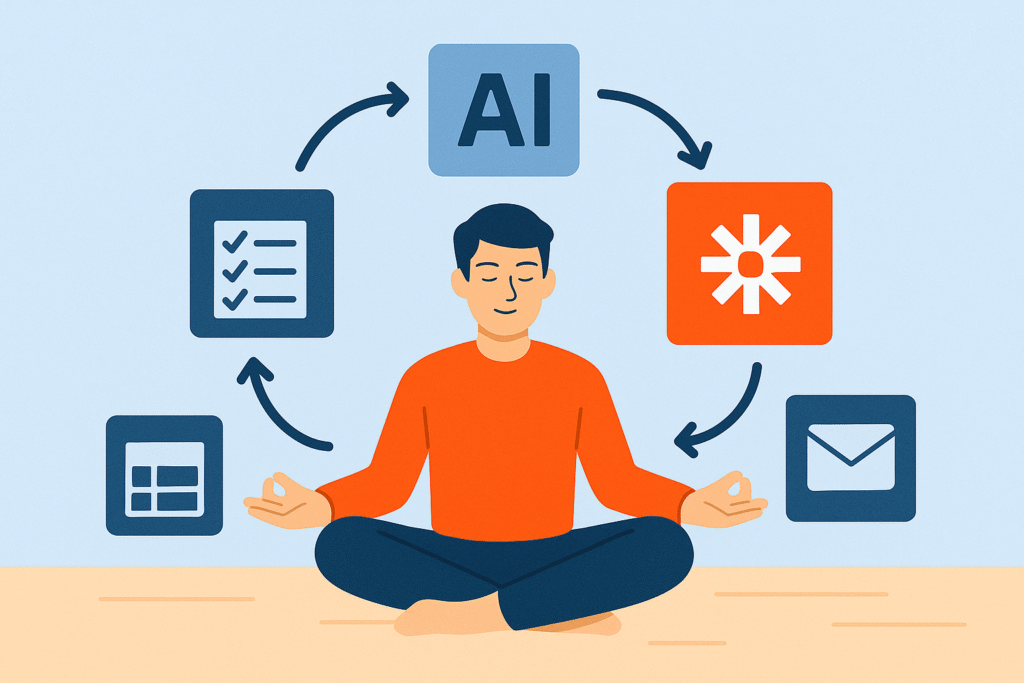Sipping your morning coffee while your calendar organizes itself, emails get sorted, tasks are assigned to your team, and your sales leads are nurtured all without lifting a finger. Welcome to the world of Zapier AI workflows.
If you’ve ever found yourself drowning in digital tasks or juggling too many productivity tools, Zapier is your personal automation assistant. And with the integration of AI tools like OpenAI and ChatGPT, it’s more powerful than ever.
What is Zapier AI Workflow?
Zapier is a no-code automation tool that connects over 6,000 apps. An AI workflow on Zapier allows you to create smart sequences—called “Zaps”—that trigger automatically based on conditions you set. Now with AI capabilities, these Zaps can do more than just transfer data; they can think, process, and decide.
Example: Let’s say a new lead fills out a form on your website. A Zapier AI workflow can:
- Capture the data and add it to your CRM
- Use OpenAI to analyze their needs based on form content
- Send a personalized email instantly
- Schedule a follow-up call based on your availability
That’s four manual tasks replaced with one Zap.
How to Start Automating with Zapier AI Workflows
Step 1: Sign Up and Connect Your Apps
Head over to Zapier.com and create a free account. Start by connecting your most-used apps: Gmail, Slack, Notion, Google Calendar, Trello, ChatGPT, etc.
Zapier works best when it knows your digital ecosystem. The more apps you integrate, the more powerful your workflows become.
Step 2: Choose Your Daily Automation Goals
To fully automate your day, start by identifying repetitive tasks. Ask yourself:
- What do I do every morning?
- What takes up too much of my time?
- Which tasks do I always forget?
Common tasks to automate:
- Morning email summaries
- Client onboarding
- Social media post scheduling
- Task updates from email to project boards
- Daily standup updates via Slack
Step 3: Build Your First AI-Enhanced Zap
Let’s walk through creating a real Zapier AI workflow that uses OpenAI to summarize your emails every morning.
Zap Setup:
- Trigger: Gmail – New Email in Inbox
- Action 1: Filter by Label or Sender (to select relevant emails)
- Action 2: OpenAI (via Zapier) – Summarize the email body
- Action 3: Slack or Email Digest – Send daily summary at 9 AM
Now you start each day with a smart, AI-generated brief in your inbox or Slack, saving 30+ minutes daily.

AI Workflow Ideas to Automate Your Entire Day
1. Morning Routine Automation
- Trigger: Time-based (7:00 AM daily)
- Actions:
- Weather update via Weather API
- Calendar digest with Google Calendar
- Email summary via OpenAI
- Daily journal template sent to Notion
2. Content Creation & Publishing
- Trigger: New blog idea saved in Notion
- Actions:
- Draft blog using ChatGPT
- Add image suggestions from Pexels API
- Send to Grammarly for review
- Schedule post on WordPress
3. Lead Management
- Trigger: New lead on Typeform or HubSpot
- Actions:
- Enrich contact using Clearbit
- Analyze interest via OpenAI
- Send personalized email using Gmail
- Assign lead to sales team on Trello
4. Project Management Sync
- Trigger: New task assigned in Asana
- Actions:
- Update Notion task board
- Send Slack notification
- Add deadline to Google Calendar
- Check task description with ChatGPT for clarity
5. End-of-Day Reporting
- Trigger: Time-based (6:00 PM daily)
- Actions:
- Collect tasks completed from Trello/ClickUp
- Summarize accomplishments using ChatGPT
- Send a progress email to your manager/team
Real-World Case Study: Automating a Marketing Agency
Client: A mid-size digital marketing agency in New York
Problem: Time lost switching between tools and manually updating tasks
Solution:
- Integrated Gmail, Slack, Google Drive, Notion, and Trello with Zapier
- Used OpenAI to auto-write social media captions based on blog titles
- Created Slack bots for daily standups, AI-generated briefs, and task updates
- Client onboarding was completely automated using Typeform + OpenAI
Results:
- 18 hours saved per week
- Reduced onboarding time from 2 hours to 10 minutes
- Boosted client satisfaction through quicker response times
Tools & Apps That Work Great with Zapier AI
Here are some of the best AI tools and integrations to amplify your automation:
| Tool Name | Function | Why It’s Great with Zapier AI |
|---|---|---|
| OpenAI / ChatGPT | Text generation, summarization, rewriting | Great for creating smart AI content |
| Notion | Workspace for tasks, docs, wikis | Organize outputs and input content easily |
| Google Calendar | Time management | Schedule tasks and reminders smartly |
| Slack | Team communication | Perfect for alerts and AI-generated updates |
| Typeform | Lead capture and surveys | Trigger personalized workflows |
| Trello / Asana | Project management | Automate task creation and updates |
| Pexels API | Image generation | Enhance AI-written content |
Pro Tips for Building Smarter AI Workflows
Use AI to Interpret and Decide
Don’t just automate; make your workflows smart.
- Let ChatGPT choose the tone of your reply
- Use sentiment analysis to prioritize emails
- Create conditional logic (e.g., IF email includes “urgent”, THEN notify by SMS)
Set Limits and Controls
- Use Zapier Paths to define outcomes based on AI output
- Monitor performance weekly
- Avoid trigger loops (like AI summarizing its own outputs!)
Secure Your Data
Zapier is secure, but always:
- Use two-factor authentication
- Limit access to sensitive workflows
- Encrypt key data fields when passing through apps
Why Zapier AI is the Future of Digital Productivity
Automation used to mean simple rule-based triggers. Now, with AI baked into platforms like Zapier, your workflows become living, adapting systems that respond to your work style, team dynamics, and real-world context.
You don’t need to be a developer. You don’t even need to write prompts. Zapier’s AI integration does the thinking. You just decide the flow.
And as AI capabilities expand, we’re entering an era where your calendar, to-do list, communication, content, and decisions can all happen on autopilot.
So the question isn’t “Should I automate?” It’s *”What will I do with all the time I save?”



